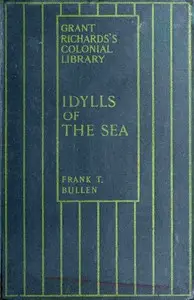"Confessions of a Tradesman" by Frank Thomas Bullen is a semi-autobiographical account written in the early 20th century. The work delves into the life and struggles of a small tradesman in London, exploring themes of financial hardship, societal challenges, and personal growth through Bullen's early experiences in commerce. The narrative is characterized by its vivid depictions of life among shopkeepers and errand boys, illustrating the often tumultuous journey from youth to maturity. The opening of the narrative introduces us to the author's childhood experiences as he steps into the world of work at a young age. Bullen reminisces about his early days working for a stern shop owner, where he faced various challenges and misadventures, such as carrying hefty supplies and dealing with demanding customers. His youthful innocence and willingness to learn shine through as he tackles tasks beyond his capabilities, providing a humorous yet poignant glimpse into the life of a boy navigating the bustling world of London's tradesmen. Through these anecdotes, the foundation of his eventual journey into adulthood and the complexities of running a business are set, inviting readers to reflect on the broader implications of resilience in the face of adversity. (This is an automatically generated summary.)

Confessions of a Tradesman
By Frank Thomas Bullen
"Confessions of a Tradesman" by Frank Thomas Bullen is a semi-autobiographical account written in the early 20th century. The work delves into the lif...
Frank Thomas Bullen, British novelist, was born of poor parents in Paddington, London, on 5 April 1857, and was educated for a few years at a dame school and Westbourne school, Paddington. At the age of 9, his aunt, who was his guardian, died. He then left school and took up work as an errand boy. In 1869 he went to sea and travelled to all parts of the world in various capacities including that of second mate of the Harbinger and chief mate of the Day Dawn, under Capt. John R. H. Ward jun in 1879 when she was dismasted and disabled. Having spent 15 years of his life at sea, since the tender age of 12, he would later describe the hardships of his early life thus: I have been beaten by a negro lad as big again as myself, and only a Frenchman interfered on my behalf. Those were the days when boys in Geordie colliers or East Coast fishing smacks were often beaten to insanity and jumped overboard, or were done to death in truly savage fashion, and all that was necessary to account for their non returning was a line in the log to the effect that they had been washed or had fallen overboard. A parallel may be drawn with Joseph Conrad's career at sea aboard Torrens 1891–1893. He was a clerk in the Meteorological Office from 1883 to 1889. His reputation was made over the publication of The Cruise of the "Cachalot" (1898); and he also wrote, amongst other books, Idylls of the Sea (1899); Sea Wrack (1903); The Call of the Deep (1907) and A Compleat Sea Cook (1912), besides many articles and essays. He lectured extensively and was highly critical of Australasia's lack of defences against what he saw as imminent naval threats from Germany and Japan. He died at Madeira on 1 March 1915.


















